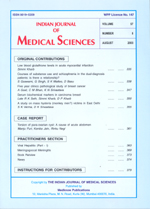
|
Indian Journal of Medical Sciences
Medknow Publications on behalf of Indian Journal of Medical Sciences Trust
ISSN: 0019-5359 EISSN: 1998-3654
Vol. 57, Num. 10, 2003, pp. 458-460
|
Indian Journal of Medical Sciences, Volume 57, Number 10, October 2003, pp. 458-460
Letter to editor
Does the right of a doctor to prescribe a branded drug without informed consent of the patient constitute a violation of patient's rights?
R. K. Bansal
Professor & Head - Community Medicine, SMIMER, Surat 395010, Gujarat.
E-mail: rajkumar_bansal@hotmail.com
Code Number: ms03032
Sir,
A significant percentage of our patients coming for medical treatment have to pay for the cost of their drugs, as out of pocket expenditure, since they do not carry any medical insurance cover, whether private or state. Therefore, an important question that arises is whether patients are receiving adequate information from their treating doctor regarding the prices of the various brands of drugs that are available in the market in context with the drug prescribed to them. The Indian Medical Council (Professional Conduct, Etiquette and Ethics) Regulations, 20021 states that every physician should, as far as possible, prescribe drugs with generic names and he/ she shall ensure that there is a rational prescription and use of drugs. It also goes on to state that it is not unethical for a physician to prescribe drugs as long as there is no exploitation of the patient and this should explicitly state the proprietary as well as generic name of the drug.
As a simple exercise I compared the prices of an antihistaminic namely Cetrizine (10 mg tablet). I found a four fold price variation from
Rs. 0.70 to Rs. 2.77. I have asked a
few colleagues and they opined that these are by and large of similar quality. The drug
quality standards in India are regulated by the
Drugs and Cosmetics Act (23 of 1940) and we have drug inspectors whose duty is to regularly
take drug samples for tests of quality.
This makes me wonder whether doctors should at all have the right to prescribe branded medicines and if they do indeed have this right then do we have the right to withhold the information from the consumer that the drug prescribed by us to them is two to four times costly than the other ones available in the market. Further as Alvarez-Castillo has rightly pointed out that given the marginalization of the poor and the highly powerful and domineering medical system a patient would hardly be in a position to give informed consent.2 The same holds true for India. Unfortunately India is a poor country, where for a significant proportion of the consumers, the cost for treatment could mean a significant expenditure. For instance, this difference in price could be a substantial amount for daily wage labourers. It may be a good idea if treating physicians could interact with their patients on the prices of various brands available in the market. Simultaneously, it would be an excellent idea if they could also take into consideration the price variations of various brand names.
An argument given by some in favour of prescription of branded drugs is that the prescribed drug is of good quality. I wonder how a doctor knows that? Besides different doctors prescribe different brands. This should
logically mean that all different brands
should be of good quality. After all a doctor has
the best interest of the patient in mind. Besides
it is a fact that in different regions of India
different brands of a drug are in vogue due to many reasons. Does it mean that the
quality of one same brand of a drug differs in
different parts of India? Though the thought that
price of a brand is related to the quality of a
drug cannot be applied and it may be a good idea to conduct some quantitative studies on
this aspect.
The nexus between drug companies and medical professionals is a well known fact and the sadly in India once a doctor passes out there is little contact between them and medical colleges. Medical representatives are a major source of information pertaining to drugs to doctors and they also visit chemist's shops to regularly monitor the prescribing habits of doctors. Perhaps we should explore developing networks where such issues could be debated. Medical associations should consider going to courts if they feel that a particular product is substandard. The government should also consider the fixing of maximum permissible price margins due to the huge asymmetry of information between the patient and the provider. Ours is a noble profession and charging of a reasonable fee for service is correct but practices as profit sharing seems to be too derogatory for this noblest of noble profession.
R. K. Bansal
Professor & Head - Community Medicine, SMIMER, Surat 395010, Gujarat.
E-mail: rajkumar_bansal@hotmail.com
REFERENCES
- Medical Council of India. Indian Medical Council (Professional conduct,
Etiquette and Ethics) Regulations, 2002. Gazette of India dated 06.04.02,
part III, section
4.
- Alvarez- Castillo F. Limiting factors impacting on voluntary first person
informed consent in the Philippines. Developing World Bioethics 2002; 2:21-7.
Copyright 2003 - Indian Journal of Medical Sciences.
| 